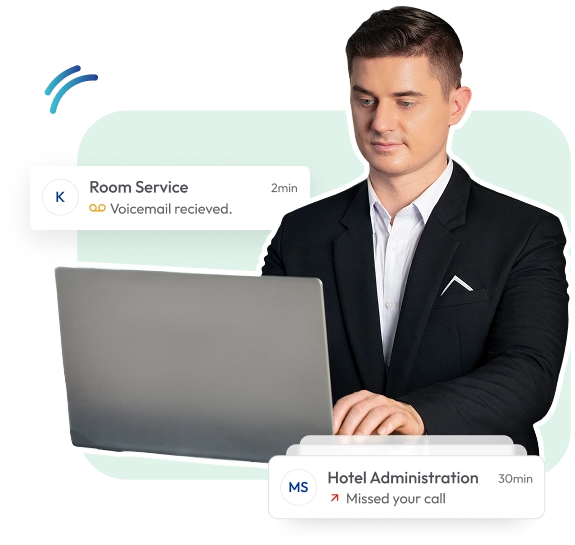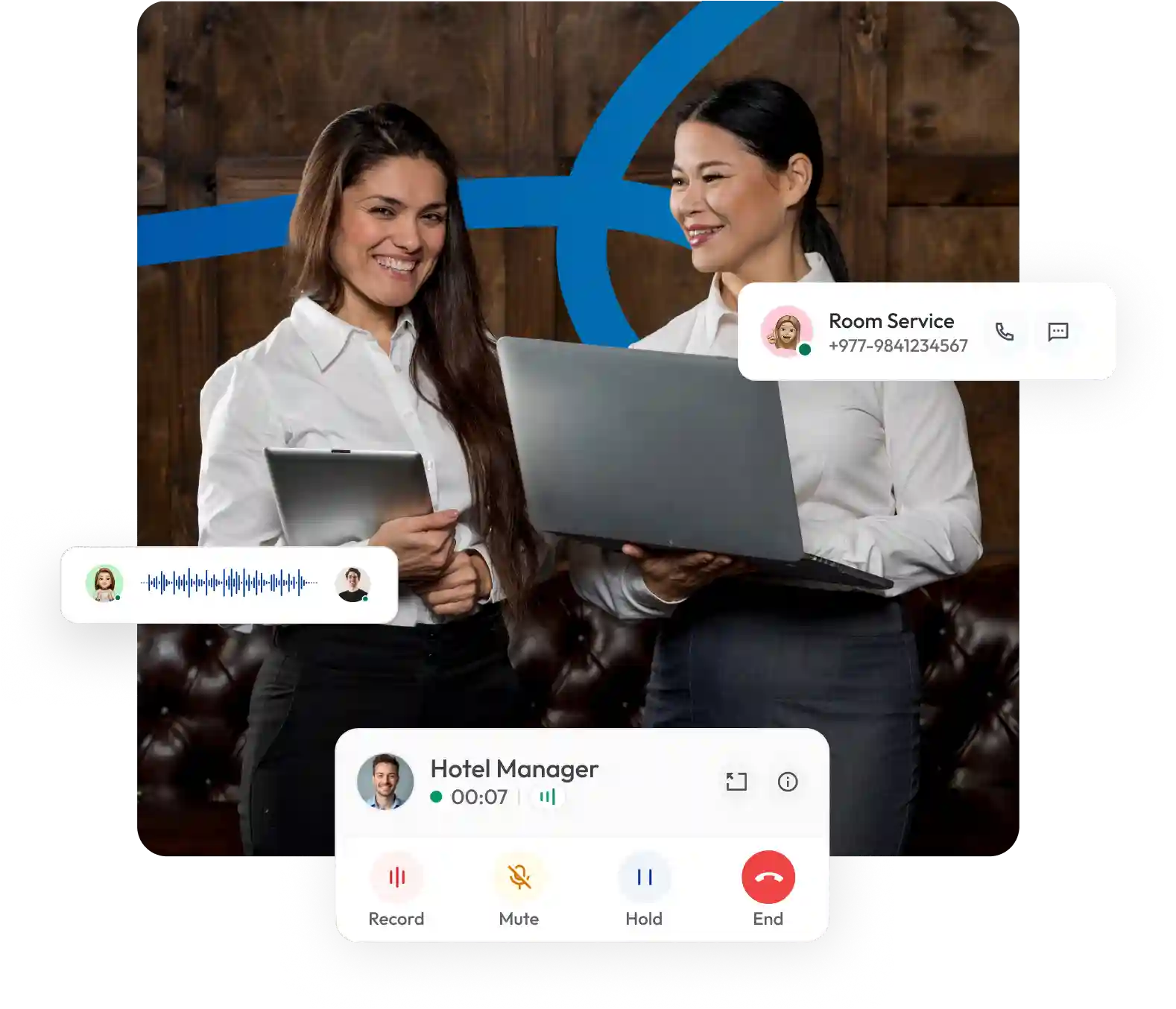Hotel phone system
Hotel Phone System for Hospitality & Guest Services
Improve your guest experience with a phone system designed specifically for the hospitality industry. Whether you're running a small motel or a large resort, Calilio's cloud-based hospitality phone system helps streamline communication, improve staff coordination, and ensure guests receive prompt, professional service at every touchpoint.

Telephony Partner of 1000+ Businesses Worldwide
Get Virtual Phone Numbers for Your Hotel & Motel Telephony
Calilio provides you with virtual phone numbers that you can use to make and receive calls online through a single hotel telephone system. Moreover, you can get toll-free numbers to make your hospitality service more accessible — there will be no phone charge for your callers.
Some Numbers May Require Proof Of ID And Address Registration According To Local Laws.
Some Phone Numbers May Not Be Available Through This Search, As They Are Not Generally Offered To Customers. These Numbers Are Available On Order Request. Please To Request Them.

How to Set Up a Virtual Phone System for Hotels?
Setting up a virtual phone system for your hotel is quick and easy with Calilio. Follow the steps below to get started with a robust hotel phone system.
Step 1
Sign up for Calilio and log in to your account.
Step 2
Go to Settings Menu, click on My Numbers, and hit the Purchase Number button.
Step 3
Select the country of your preference
Step 4
Choose your number type: Local, Mobile, or Toll-Free.
Step 5
Select a number from the given options list and click the Add to Cart button next to it.
Step 6
Proceed to pay, and your virtual number activates instantly.
Set Up Telephone System for Hotels in 100+ Countries
With Calilio, hotels can obtain virtual numbers from over 100 countries. Improve your global presence without the need for physical offices.
Features of Hotel Phone System for Guest Calls & Internal Communication
Calilio is designed with the unique needs of the hospitality industry in mind. From managing guest calls to efficient internal coordination, our VoIP-powered hotel phone system provides a range of features that enhance your hotel’s operations.
Call Routing
Automatically route calls to the appropriate department or service, such as reservations, front desk, or room service, improving efficiency and response times.

Benefits of VoIP-powered Telephone Systems for Hotels
By replacing traditional phone lines with Calilio — a modern VoIP-powered telephone system for hotels — your hospitality service can stay connected with guests and teams more efficiently.
Cost-Effective Telephony Solutions
A virtual hospitality phone system eliminates the need for expensive phone lines. Calilio allows you to make and receive calls over the internet with minimal calling charges.
Faster Response Times
Flexibility and Mobility
Internal Communication
Scalable and Customizable
Best Phone Systems for Hotels Compared: Features & Price
| Features | Calilio | 8×8 | GoTo Connect | Nextiva | RingCentral |
|---|---|---|---|---|---|
| Starting Price (per user) | $15 | $25 | $27 | $25.00 | $30 |
| Virtual Phone Numbers | 100+ countries | 100+ countries | 50+ countries | Not specified | Not specified |
| Call Management | IVR, call routing, voicemail | IVR, call queues, call analytics | Smart routing, analytics | Multi-level IVR, call transfer | Call routing, analytics |
| Mobile App | Yes | Yes | Yes | Yes | Yes |
| International Calling | Anywhere | Limited | Over 50 countries | Not specified | Over 40 countries |
| CRM Integration | Yes | Yes | Yes | Yes | Yes |
| 24/7 Support | Yes | Yes | Yes | Yes | Yes |
| Ideal For | Small to medium-sized hotels | Large enterprises | Large enterprises | Large enterprises | Large enterprises |
Pricing
Calilio has flexible pricing plans to suit hotels of all sizes, from small boutique hotels to large resorts. Our hospitality phone system grows with you — you can add features or scale up as your hotel expands.
Enterprise Plan
Custom
Everything in the Premium Plan, plus:
- Queue Call BackComing Soon
- All Call Strategy Features
- Dedicated Account Manager
- Phone and WhatsApp Support
Integrate Your Hotel Phone System With Your Favorite Business Tools
Zapier
Automation
Pipedrive
CRM
Pabbly Connect
Automation
LeadHeed
CRM
HubSpot
CRM
Salesforce
CRM
Mailchimp
Marketing
Krispchat
Sales Automation
Zendesk
Helpdesk
Request Integration
Frequently Asked Questions
What is a hotel phone system?
How does a hotel phone system work?
What kind of phones are in hotels?
What is PBX in the hospitality industry?
Do hotels use VoIP?
What are the best hotel phone systems?
How many lines does a hotel phone system have?
What are the differences between hotel phone systems and traditional phone systems?

Still have questions?
Can’t find the answer you’re looking for? Please chat with our friendly team.
Transform Your Business Telephony with Calilio
Step into the future of seamless connectivity with Calilio. Choose our advanced business phone system and revolutionize your business telephony today.
Phone numbers
Get International Phone Numbers
Singapore
|Australia
|New Zealand